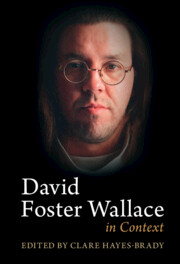Book contents
- David Foster Wallace in Context
- David Foster Wallace in Context
- Copyright page
- Contents
- Figures
- Contributors
- Acknowledgments
- Abbreviations
- Introduction
- Part I Contexts
- Part II Ideas
- Chapter 10 David Foster Wallace and Attention
- Chapter 11 After Analysis
- Chapter 12 Perfectionism and the Ethics of Failure
- Chapter 13 The Pragmatist Possibility in David Foster Wallace’s Writings
- Chapter 14 A Tale of Two Theses
- Chapter 15 Free Will and Determinism
- Chapter 16 David Foster Wallace’s Mathematics of the Infinite
- Chapter 17 David Foster Wallace and Existentialism
- Chapter 18 David Foster Wallace and Religion
- Chapter 19 Mr. Consciousness
- Part III Bodies
- Part IV Systems
- Works by David Foster Wallace
- Bibliography of Secondary Sources
- Index
Chapter 19 - Mr. Consciousness
from Part II - Ideas
Published online by Cambridge University Press: 18 November 2022
- David Foster Wallace in Context
- David Foster Wallace in Context
- Copyright page
- Contents
- Figures
- Contributors
- Acknowledgments
- Abbreviations
- Introduction
- Part I Contexts
- Part II Ideas
- Chapter 10 David Foster Wallace and Attention
- Chapter 11 After Analysis
- Chapter 12 Perfectionism and the Ethics of Failure
- Chapter 13 The Pragmatist Possibility in David Foster Wallace’s Writings
- Chapter 14 A Tale of Two Theses
- Chapter 15 Free Will and Determinism
- Chapter 16 David Foster Wallace’s Mathematics of the Infinite
- Chapter 17 David Foster Wallace and Existentialism
- Chapter 18 David Foster Wallace and Religion
- Chapter 19 Mr. Consciousness
- Part III Bodies
- Part IV Systems
- Works by David Foster Wallace
- Bibliography of Secondary Sources
- Index
Summary
While Wallace’s fiction is famously “about what it means to be a fucking human being,” there is a consistent strain of posthumanism in his writing that has formed a rich thread of scholarship, from Hayles’ technological lens and Giles’ sentimental reading through to Hayes-Brady’s consideration of the body as object, Hering’s examination of the self as a spatial nexus and Vermeule’s Schopenhauerian reading of mind/body dualism. Indeed, it is difficult to encounter Wallace at all without a consideration of the post-ness of his humanism. At the heart of this posthumanism is an ambivalence about the locus of the self in a deeply networked yet alienating world, where telephones and roads are as much a barrier to communion as they are conducive. Beginning with the most disembodied characters – Wallace’s many ghosts – the chapter draws attention to the ways in which the disembodied self in Wallace’s work – pure consciousness – is limited and impotent. The chapter also examines the representation of the most deeply embodied characters – babies – as the other side of this coin, incoherent and narcissistic. Engaging philosophies of dualism and embodiment as well as drawing on the more recent neuroscientific turn in literary studies, this chapter argues that consciousness for Wallace involves imagining the mind in and of the body. This chapter connects this section with the following one, reminding us that for Wallace the self exists always and only within the world.
- Type
- Chapter
- Information
- David Foster Wallace in Context , pp. 203 - 212Publisher: Cambridge University PressPrint publication year: 2022



